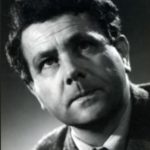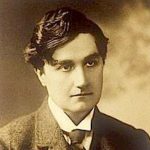‘In Terra Pax’ Finzi & ‘Dona Nobis Pacem’ Vaughan Williams – 8/12/2018
A Saturday evening concert in Sunderland Minster starting at 7.30 p.m., conducted by David Murray.
Tickets £14.00 for Nave (£8 concessions for full-time students and on income related benefits) or £8.00 (Gallery – limited view). Accompanied under 16s free. Tickets are available from members of the Society, at the door, or on-line from http://www.wegottickets.com/BCS – who also have a direct link on the home page of this website. Doors open from 6.45 p.m.
 Gerald Finzi was born in London on July 14, 1901, and spent his early childhood in London. His father died when he was just seven and following the outbreak of the First World War Finzi moved with his mother to Harrogate, in Yorkshire. There Finzi was able to study composition with the composer Ernest Farrar and from 1917 with Edward Bairstow at York Minster. But attracted by the beauty of the English Countryside, Finzi moved to Painswick, Gloucestershire, in 1922 where he was able to compose in tranquility
Gerald Finzi was born in London on July 14, 1901, and spent his early childhood in London. His father died when he was just seven and following the outbreak of the First World War Finzi moved with his mother to Harrogate, in Yorkshire. There Finzi was able to study composition with the composer Ernest Farrar and from 1917 with Edward Bairstow at York Minster. But attracted by the beauty of the English Countryside, Finzi moved to Painswick, Gloucestershire, in 1922 where he was able to compose in tranquility
A series of tragedies profoundly affected Finzi in his early years. By the time he was eighteen he had lost his father, three elder brothers and his much-loved music teacher, killed in action. This dreadful sequence of events, and the appalling losses of the First World War that formed the backdrop to his adolescence, gave Finzi an acute awareness of the impermanence of life, confirmed with grim finality when at the age of fifty he discovered that he was dying of leukaemia. These experiences to a large extent account for the hint of melancholy underlying much of his music.
Written just two years before Finzi’s death in 1956, In Terra Pax skilfully juxtaposes words of Robert Bridges (which are set for the baritone soloist) with the familiar Christmas passage from St Luke (set for the soprano soloist and chorus). With a childlike serenity of style, the work unites all its feelings, images and familiar events into one simple, shapely musical narrative. With its seasonal theme, it makes the most attractive centre-piece for any Christmas choral programme.
 Ralph Vaughan Williams was born into England’s upper class, destined for the nonworking life of a gentleman. But he grew up during a renaissance in English music, spurred by knighted composers Charles Hubert Parry, Charles Villiers Stanford, and George Grove. At London’s Royal College of Music, Vaughan Williams studied composition under Parry, who believed England should have its own distinct music, free of German influence. In an era when many homes had pianofortes and choral societies were widespread across England, the music of the German masters ruled. Vaughan Williams and his friend Gustav Holst dedicated themselves to creating English-defined music, reviewing each other’s compositions with honesty and vision for 40 years.
Ralph Vaughan Williams was born into England’s upper class, destined for the nonworking life of a gentleman. But he grew up during a renaissance in English music, spurred by knighted composers Charles Hubert Parry, Charles Villiers Stanford, and George Grove. At London’s Royal College of Music, Vaughan Williams studied composition under Parry, who believed England should have its own distinct music, free of German influence. In an era when many homes had pianofortes and choral societies were widespread across England, the music of the German masters ruled. Vaughan Williams and his friend Gustav Holst dedicated themselves to creating English-defined music, reviewing each other’s compositions with honesty and vision for 40 years.
His cantata Dona Nobis Pacem, premiered in 1936, opens with a heartrending cry expressing both the composer’s and the public’s anguish over the worsening political situation in Europe, which would lead again to war. Vaughan Williams devoted the years of World War II to helping refugees find shelter and work, providing food by planting huge vegetable gardens and keeping chickens, and helping to stage free lunchtime concerts.
The whole work is welded together by the composer’s sense of urgency; his ‘main inspiration is drawn not from the soil of England, but from the whole world going mad around him’. The music for the words from Micah (‘nation shall not lift up a sword against nation, neither shall they learn war any more …’), and thereafter, becomes more optimistic, here the music returns to a state of hesitant prayer sung ppp by the chorus and solo soprano, a prayer that at the time was not to be granted.




